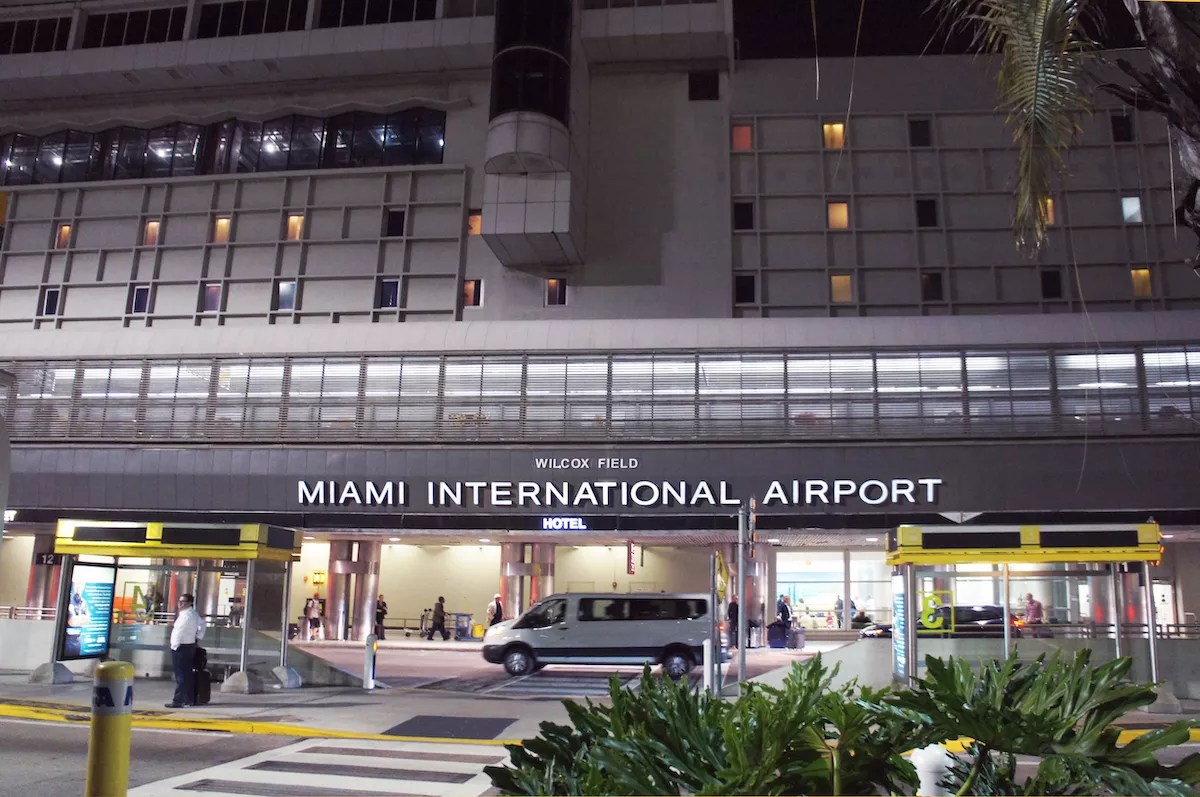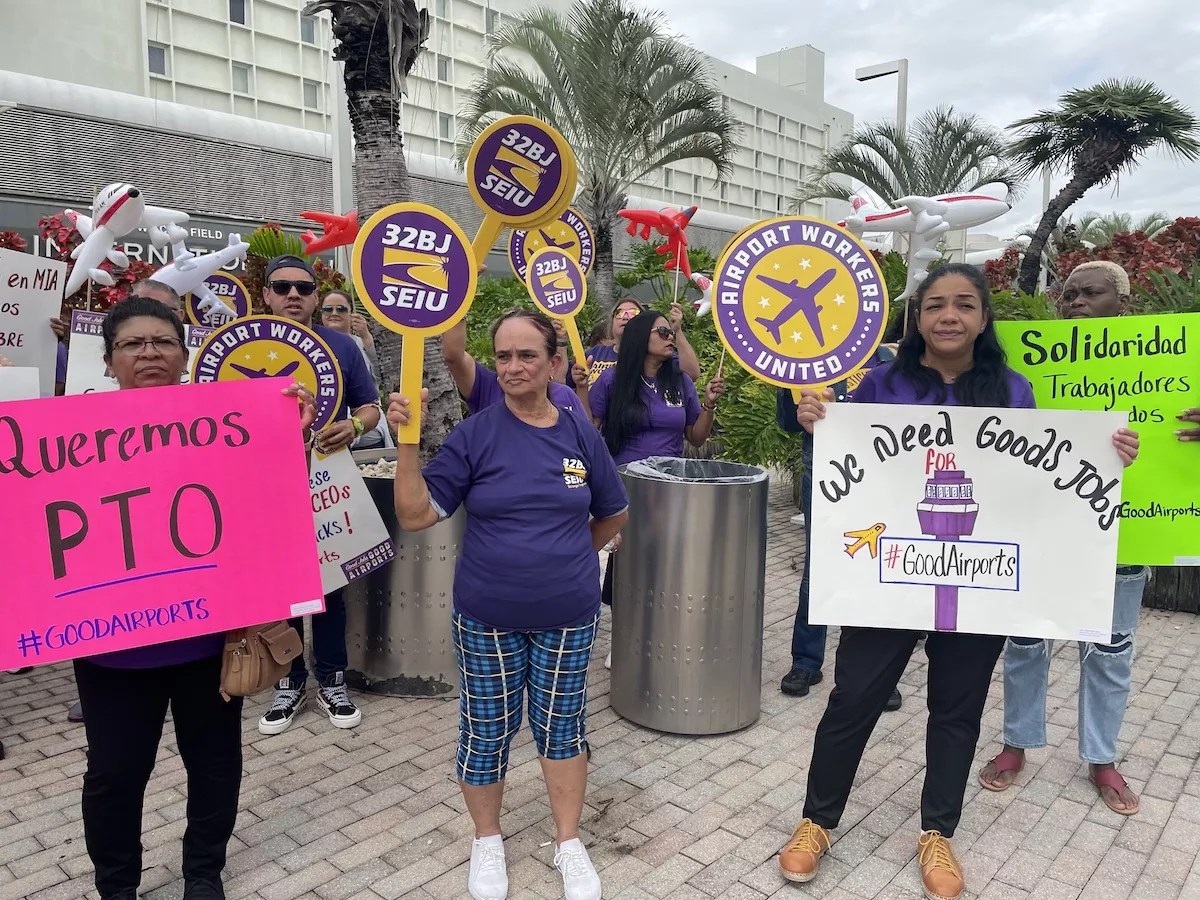

Audio By Carbonatix
For more than a decade, Maria Bogarín has worked as a contracted cabin cleaner at Miami International Airport, scrubbing down planes and hauling heavy carts of cleaning supplies to and from the aircraft. She’s also chipped in as a driver, chauffeuring her fellow crew members and their equipment around the runway between cleanings.
Lately, Bogarín, 37, has struggled with debilitating sciatic nerve pain, which travels from her back down each of her legs.
At one point, it became so severe that she could no longer walk, she says. She recalls having to teach her 7-year-old daughter how to cook her own meals and care for her infant brother. She was out of work for an entire week.
However, because she, like many of her co-workers, does not have sick days, she didn’t receive any pay during her time off.
She calls it a “nightmare.”
“As a single mom, it’s absolute chaos not being able to have paid sick days,” Bogarín tells New Times. “If you’re taking several unpaid days from work, it creates a financial burden that you have to recover from.”

In October, Miami airport service workers kicked off their “MIA Needs PTO” campaign.
Via 32BJ SEIU Florida
Today, just before the bustling holiday travel season, Bogarín and her co-workers – contracted cabin cleaners, baggage handlers, cargo workers, and other service workers – will join labor groups gathering at more than 15 airports across the country to call on Congress to pass the Good Jobs for Good Airports Act. The bill is aimed at ensuring airport service workers receive livable wages and reasonable benefits such as paid sick days.
According to the Service Employees International Union (SEIU), airport service workers’ jobs have become especially demanding in recent years amid staffing shortages and other issues arising from COVID-19. Despite the hardship, the vast majority of contracted service workers at Miami International Airport do not have paid sick days, the union says.
Bogarín tells New Times that when she is seriously ill, she has to use up her vacation days just to get by.
“But if I use my vacation when I’m sick, then I won’t have time to spend with my kids or take them anywhere,” Bogarín says. “So it’s a battle.”
Introduced over the summer by Massachusetts Senator Ed Markey, the Good Jobs for Good Airports Act would require airports that receive federal project grants to pay their airport service workers at least $15 an hour with fringe benefits that meet prevailing community standards.
The bill was referred to the Senate Committee on Commerce, Science, and Transportation in June.
Aircraft cabin cleaners make on average $15 an hour nationwide, according to a ZipRecruiter review. Roughly sixteen percent of them make less than $10.10 an hour, equating to a salary of $15,500 to $20,900.
Helene O’Brien, director of SEIU, Local 32BJ – the union that represents contracted airline workers at Miami International Airport – explains that airport service workers were once employed directly by airlines. But since deregulation in the 1970s, airlines have outsourced much of their work, securing laborers through companies that the airlines select via a competitive bidding process.
O’Brien notes that the airlines often hire the cheapest companies.
“If there’s no kind of minimum standard set, not only around pay, but also around paid time off or other benefits, we’ve seen over the past two decade that the bottom falls out economically for those jobs,” O’Brien says. “And so this bill is a way to fix that.”
Bogarín says that for her and her co-workers, many of whom served more than two years in a pandemic and fell ill with COVID-19 from on-the-job exposure, the passage of this bill is vital not only for their finances, but for morale.
“There are many workers like me who’ve worked at the airport for very long. They are also suffering, they are also experiencing pain in their backs and their legs from all of the years of heavy work that they’ve done,” Bogarín says. “And we would like to feel supported for the work that we do.”
In Februrary 2021, Miami-Dade Mayor Daniella Levine Cava ended a contract between the county and Eulen America, a company that subcontracted service employees for American Airlines, Delta, and other airlines at Miami International Airport. This followed years of reports of abusive working conditions, including claims of employees being forced to work when sick, and facing retaliation against for speaking out.
Eulen had subcontracted employees to clean airplane cabins and handle luggage for the airline companies, among other tasks.
According to the Service Employees International Union, Eulen and other contractors have made strides in improving workplace conditions and raising wages, but the lack of employment protections on a federal level remains a problem.
“We are calling for a national standard so that we can ensure every airport worker across the country has good wages and lifesaving benefits, which will also alleviate labor shortages,” O’Brien says.